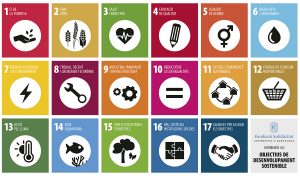The documentary focuses on the flagship project of the UB Support program for refugees: the Transition course to university, co-financed by the University and the Barcelona City Council.
The Paranimph of the Historical Building of the UB held, on Monday, the event “Barcelona, refuge city and university”, organized by the University of Barcelona and the City Council.
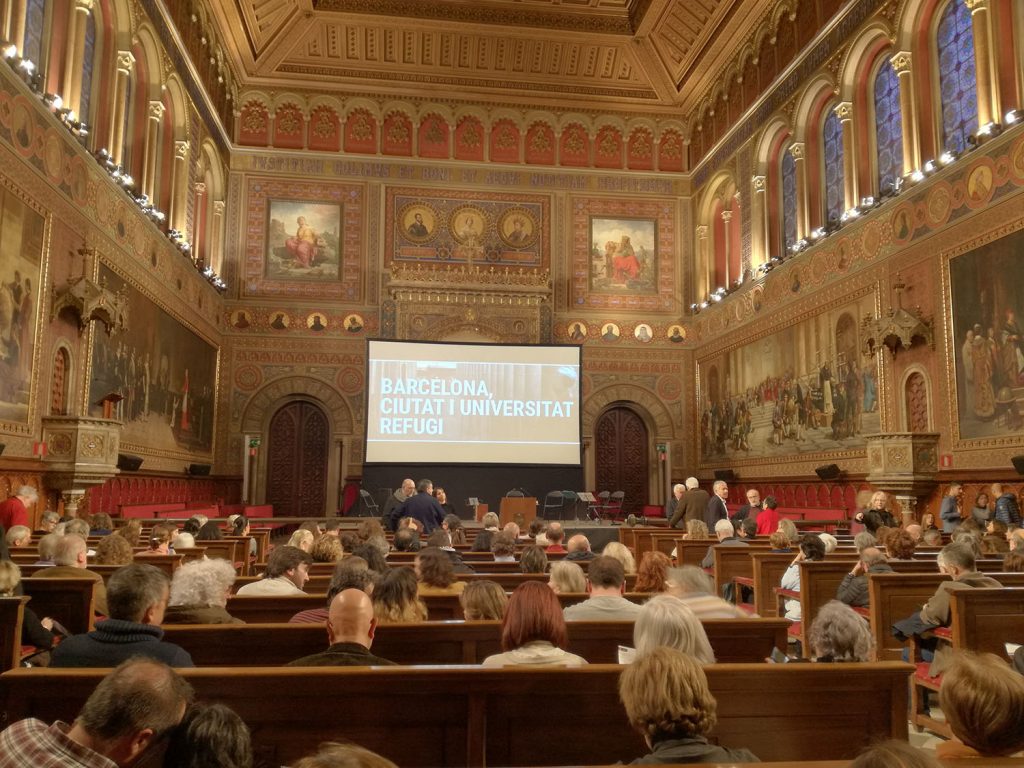
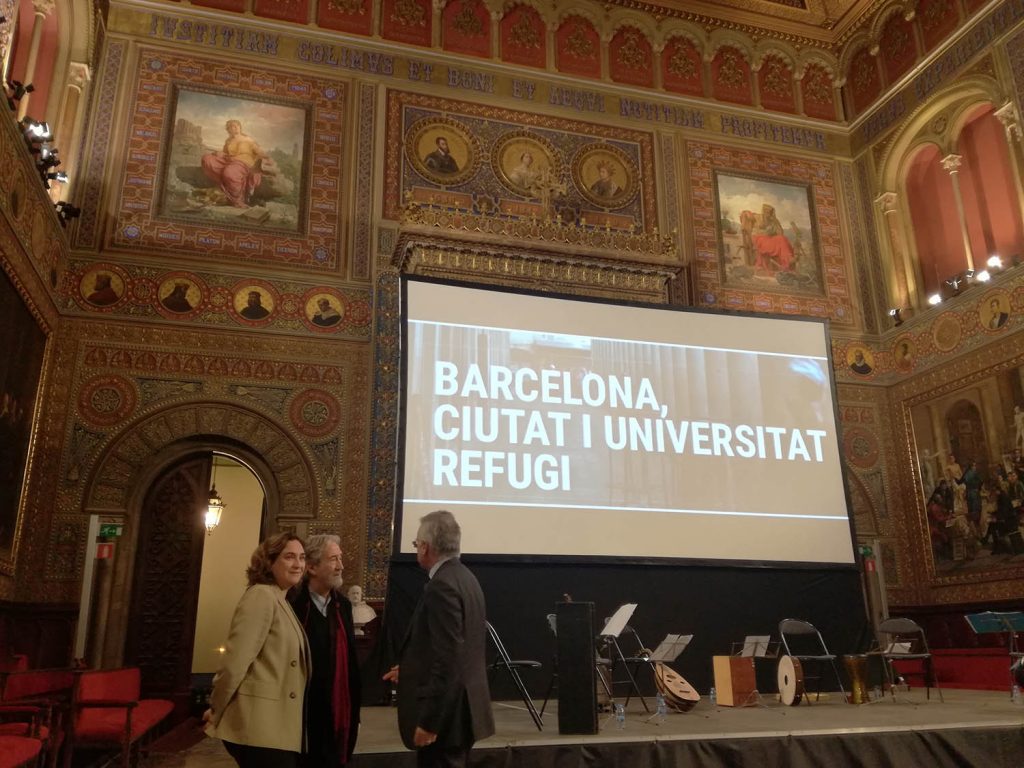
The activity held the presentation and screening of the documentary Universitat refugi, which collects the actions of promotion and support both institutions carry out to ease the access to higher education for refugees. After the screening of the documentary, the activity followed with a concert by the band Orpheus XXI, a project launched by Jordi Savall, and formed by refugee and immigrant musicians from different countries.
Presided by the rector of the University, Joan Elias, among the participants in the event were the mayor of Barcelona, Ada Colau; the soloist, pedagogue and researcher Jordi Savall, appointed EU Ambassador for Intercultural Dialogue (2008); and Pau Faus, director of the documentary Universitat refugi.
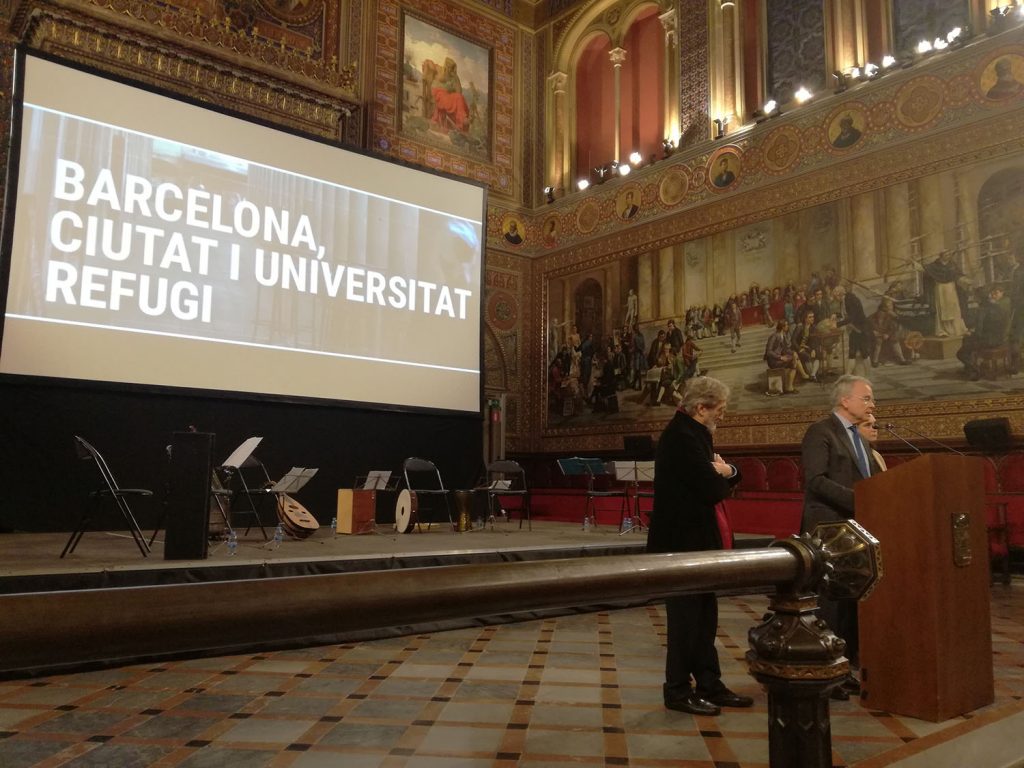
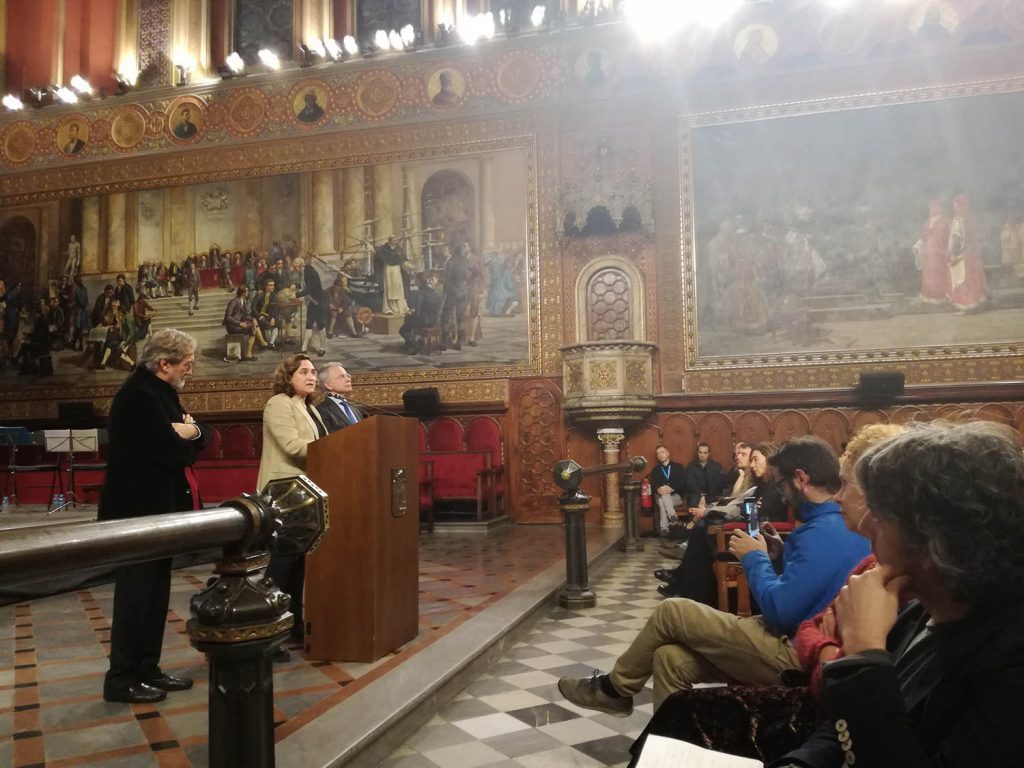
«The university cannot leave aside the realities of our world», noted the rector in his speech. «Aware of our responsibilities, in 2015 the UB launched the Support program for refugees and people from conflict areas». Elias continued his speech putting emphasis on how «pioneer» this initiative was and thanked the people and institutions who are part of the program, especially the Barcelona City Council. The rector ended his speech expressing his wish to expand the program to all the Spanish universities that wish to join, «for, in order to build a better future in a dignified and free world, we need everyone’s capacities. This is when we talk about the UB as an inclusive university», he concluded.
Afterwards, the mayor Ada Colau, noted only 3% of the refugees have access to higher education and stated «this is a violation of fundamental rights, one of the many violations of rights they suffer». This is why she thanked the rector and the UB for the organization of today’s event together with the Department of Global Justice and International Cooperation of the City Council.
According to the mayor, the UB Support program shows «we do not give up, we show imagination, invention and a will to build a better city» with local solutions that respond to global problems. The mayor noted we have to «be clear». «The migratory phenomenon has to worry us all, regarding those who escape from war, misery, violation of human rights and the climate emergency», she noted.
UB Support program for refugees and people from conflict areas
In September 2015, due to the massive move of refugee people from Syria, the University of Barcelona, aware of the asylum crisis worldwide, decided to create the UB Support program for refugees and people from conflict areas, coordinated by the UB Solidarity Foundation. Among other actions, this initiative includes university enrolment grants, accommodation options and language learning courses. The Program organizes activities on information, training and awareness on the crisis of the right to asylum and it includes the participation of the UB in European and international projects such as inHERE (Higher Education Supporting Refugees in Europe) and RESCUE (Refugees Education Support in MENA countries).
In order to carry out these activities and projects, the Program worked on an internal working network with twenty groups, departments and areas of the UB; an interuniversity collaboration network, and an external network, which includes public administrations, education centers, companies and entities working in the field of refuge. The Program has been chosen to be in the Good Practice Catalogue in welcoming refugees in Higher Education of the inHERE project as an example of strategical approach for sustainability, and has been copied by the Programa d’acollida d’estudiants refugiats del Líban (Welcome program for refugee students from Lebanon) of the Catalan Government.
«Barcelona, refuge city and university», a safe and regulated refuge
One of the first collaboration agreements in the UB Support program for refugees was set with the Barcelona City Council, through the Department of Global Justice and International Cooperation. The UB and the Barcelona City Council co-fund the insignia project of this initiative. This is the Transition course to university, an official university extension course with three blocs: simultaneous learning of Catalan and Spanish and knowledge of social and cultural environment; notions on human rights and culture of peace, and preparation for labour market.
Every year, there are fifteen grants for this course —which reaches its third edition this year— for students under situations of economic vulnerability and human rights. These grants include accommodation, academic support, tutoring, legal advice, psychological assistance and support for labour market incorporation, among other things. Once the students pass the course, and if they fill the access requirements, they can enrol in the UB academic offering, and enjoy the backup of the Program. Forty-five students will have enjoyed this course once the third edition ends.
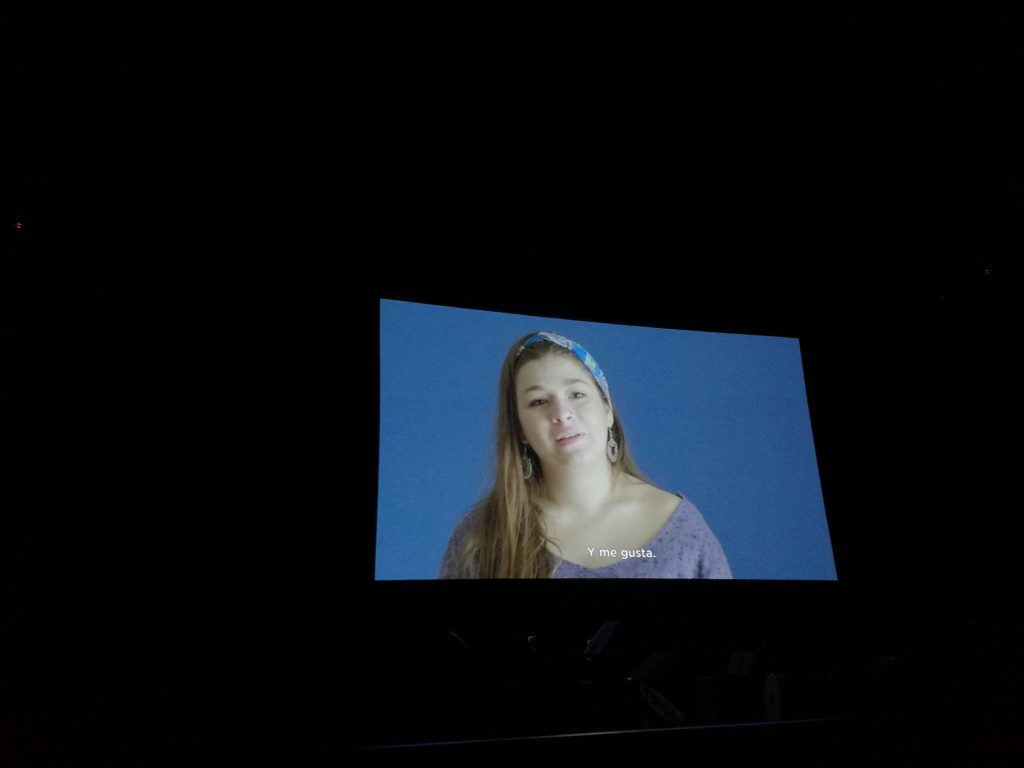
The experience of two students of this course focuses the documentary Universitat refugi, directed by Pau Faus and produced by Nanouk Films, which contextualizes and explains the collaboration between the UB and the Barcelona City Council since 2016, as well as the commitment of these institutions to promote education and create safe spaces in which the refugee students can rebuilt their vital and educational career.
Orpheus XXI, music for life and dignity
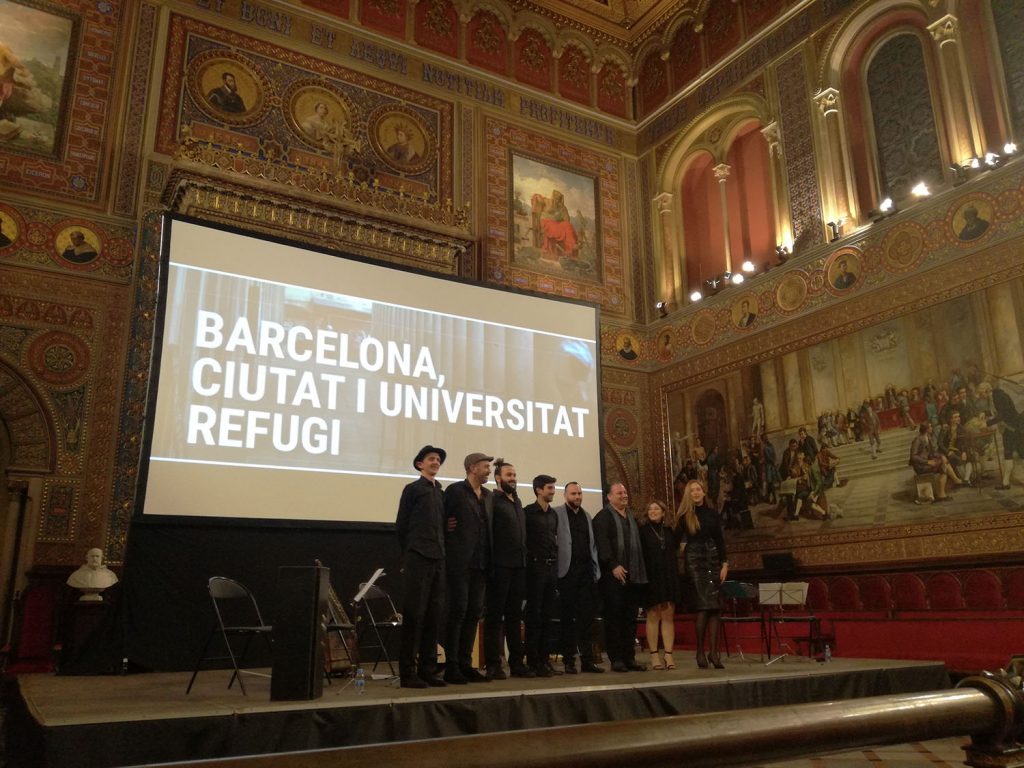
As seen in the documentary, one of the students of this course is also a member of Orpheus XXI, an intercultural pedagogical and creative action project, under the artistic direction of Jordi Savall and the direction of Moslem Rahal, which works for the integration of young refugees and immigrants (from any country) with musical knowledge or talent.
The aim of the project is to help these young students to improve their knowledge so they can make music and share it with other people from different ethnic and cultural groups. The final result of this project is presented in concerts, aimed at a European audience, largely children from schools, in the area or country where this immigrant people live.
The project is subsidized by the program Refugee Integration Projects of the EU Education, Audiovisual and Cultural Executive Agency (EACEA), and is carried out in collaboration with four institutions: the International Ancient Music Centre Foundation (Spain), the Saline Royale of Arc-et-Senans (France), COOP’AGIR association – Coopérer et Agir pour l’emploi, l’hébergement et le logement (France) and International Cities of Refuge Network (ICORN, Norway).
This news is related to the following SDG of 2030 Agenda:








